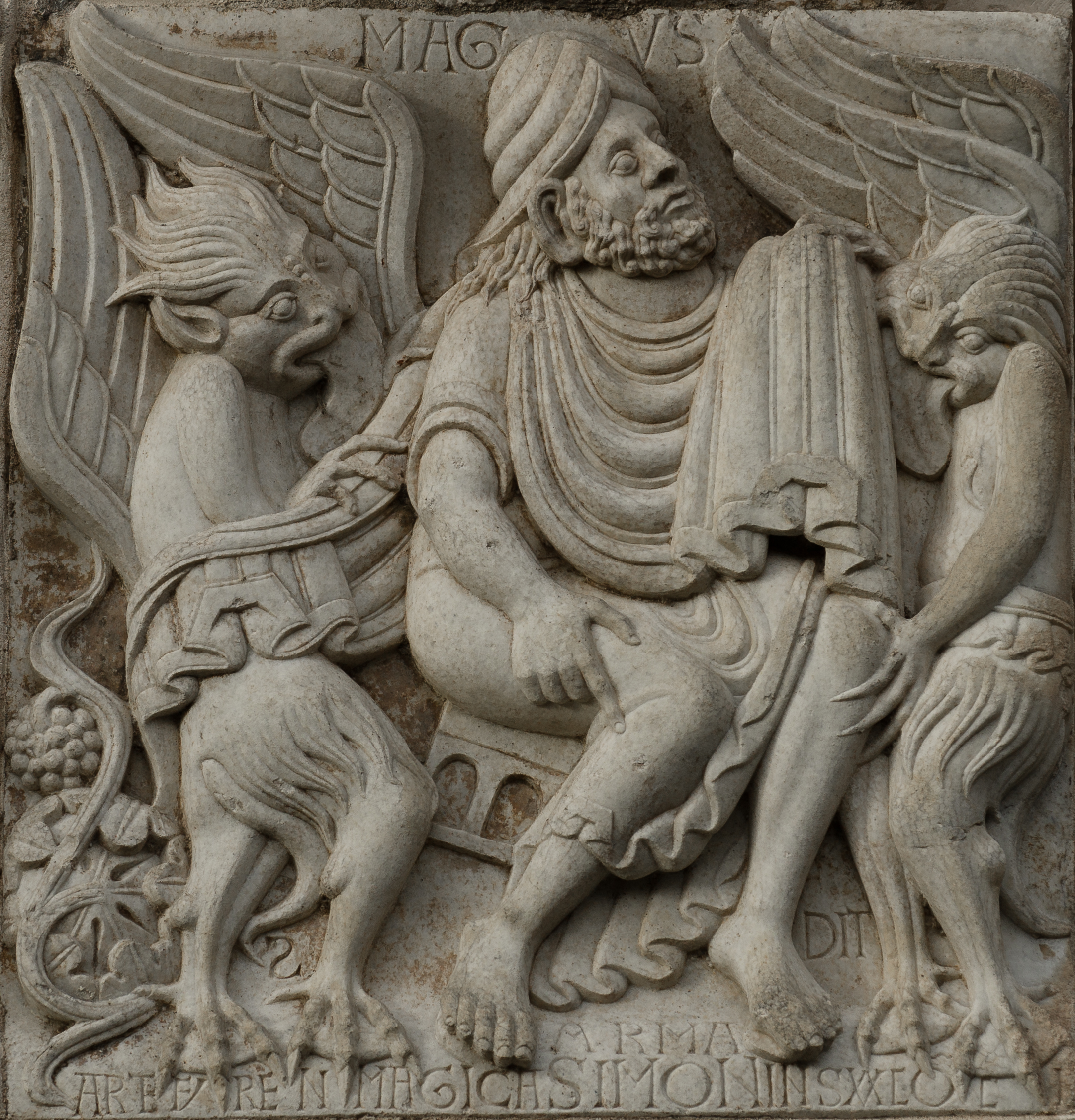Blog
The Sad Case of Simon the Sorcerer
Thursday, February 11, 2021
When it begins, the chronicle of Acts 8:4-24 looks like another one of the success stories of the early church. As often happens throughout the book, when someone (in this case, Philip the Evangelist) brings the gospel to a new location (in this case, the city of Samaria), it is received with joy. As also happens, like Elymas in Cyprus, Sosthenes in Corinth, and Demetrius in Ephesus, an opponent of the gospel emerges, somebody who views the early church as spiritual competition. In Acts 8, this opponent is Simon, a (stage) magician who had been leading the people astray for a good while.
However, in Acts 8, the narrative doesn’t go in the expected direction. Rather than being blinded or getting beaten, Simon himself becomes a disciple. He believes in Jesus! He is baptized! Indeed, he abandons his deceptive lifestyle, following Philip and being amazed himself rather than amazing others.
Tragically, events expose Simon to a temptation that he fails to resist. Peter and John come to town and, as only apostles can do, begin to impart miraculous spiritual gifts to others by laying hands on them. Simon’s reaction, though, reveals that despite his conversion, he has come to the Lord with significant baggage. He offers the apostles money in exchange for the ability to pass along the Holy Spirit himself. Though the text doesn’t say so, we can infer that Simon wasn’t planning to offer those gifts for free.
Peter forthrightly condemns Simon for his covetous heart, and Simon’s ambiguous reply leaves us uncertain whether he has repented or not. Ultimately, he proves to be little different than the other villains of the book of Acts.
Nonetheless, Simon’s example offers us two valuable spiritual lessons. First, he shows us that it is all too possible for us to fall away. This is denied by Calvinists, who hold to the doctrine of eternal security. Typically, they will argue that Simon wasn’t really saved. He only appeared to be.
However, rather than offering security, this argument merely replaces uncertainty about our ultimate fate with uncertainty about our initial salvation. If Simon was not saved despite having believed and having been baptized, none of us can be sure that we were saved through belief and baptism either. Additionally, if Jesus says in Mark 16:16 that those who believe and are baptized will be saved, who are we to disagree, even in the case of Simon?
Second, Simon shows how the flaws in our character before we come to the Lord can distort our service to Him. He had been a con man, and despite his awe at the power of God, it ultimately meant nothing more to him than a way to make money. So too for us. If we are not careful, the lust, pride, or greed that ruled us before Christ will simply find a new expression in a religious context. If we wish to inherit eternal life, we must succeed where Simon failed by making no provision for the flesh and its lusts.
Psalm 35
Tuesday, February 09, 2021
Lord, fight with those who fight with me;
Take up Your shield and bring me aid;
Your spear must save me from my foes;
Let them be baffled and dismayed!
May Your good angel drive them on
And make their pathway slippery;
They spread their nets without a cause;
Repay what they had planned for me.
Then I shall glory in the Lord
Who saves afflicted ones from strife,
For lying witnesses rise up;
I helped them, but they seek my life.
When they were sick, I mourned and prayed
As for my mother or a friend,
But when I stumbled, they rejoiced
And slandered me without an end.
O Lord, how long will You look on?
From their destruction, set me free,
And I will praise You in the midst,
For they accuse me wrongfully.
They speak not peace but lying words,
Though I was quiet and at rest.
They opened wide their mouths at me
And testified that I transgressed.
You know the truth; O Lord, reply!
Stir up Yourself; defend the right;
According to Your justice, judge;
Do not abase me in their sight.
Let those who hate me be cast down
While those who love the truth rejoice;
Then I will tell Your righteousness
And praise Your name with heart and voice.
Suggested tune: “In Christ Alone”
Women Participating in Bible Classes
Thursday, February 04, 2021
Recently, I’ve been engaged in an email discussion with a brother on the subject of women participating in our Bible classes. He sees inconsistency in many congregations between Bible classes, in which women may read Scriptures, make comments, etc., and worship services, in which they are required to remain silent. He believes that the appropriate way to resolve this inconsistency is to bar women from participating in Bible classes as well.
In a time in which all too many churches have chosen to ignore 1 Corinthians 14:34-35 and 1 Timothy 2:11-12 altogether, I appreciate this brother’s zeal for God. However, I believe his analysis overlooks some key aspects of our worship services and misunderstands the contextual meaning of silence in 1 Corinthians 14.
First, although many find it convenient to overlook the fact, I doubt there is a single church of Christ in existence in which women are literally silent during worship services. They sing. Indeed, according the language of Ephesians 5:19, they speak to the rest of the congregation in psalms and hymns and spiritual songs. Women speak in our assemblies!
This practice is uncontroversial. I’ve never heard anyone argue seriously that women should not participate in our song worship. Indeed, I’ve never heard anyone argue against alto-lead choruses, during which women often are the only ones singing. It’s impossible to argue that women literally are being silent in the churches during “Paradise Valley”!
This leaves us with two choices. We can read 1 Corinthians 14:34-35 as a flat contradiction of Ephesians 5:19, so that Paul is divided against Paul (and the Holy Spirit against the Holy Spirit). Alternatively, we can quit using 1 Corinthians 14:34-35 as a proof text isolated from its context and consider if there is anything in that context that ought to inform our understanding of silence.
Indeed, though this commonly is overlooked, women are not the only group told to be silent in 1 Corinthians 14. In 14:28, those with the gift of speaking in tongues are told to keep silent unless an interpreter is present. In 14:30, if, while a prophet is speaking, a second prophet receives a revelation, the first prophet is to be silent and allow the second to speak.
It makes little sense to take “silent” here literally, especially in the case of the tongue-speakers. Tongue-speakers were allowed to participate in song worship. If men, they were allowed to lead public prayers, as per 1 Timothy 2:8. Paul means only that they were not allowed to be the sole speaker, to hold the floor in a situation in which they could not edify the church. Similarly, Prophet #1 was not allowed to be the speaker, to attempt to maintain the floor in the face of Prophet #2’s revelation.
Contextually, then, the injunction of 1 Corinthians 34-35 to women to keep silent does not mean that women cannot speak. It means that women cannot be the speaker. They are not permitted to exercise authority in the assembly as a man may.
We glimpse the nature of the problem that Paul is addressing in the instruction of 14:35 for women to ask their husbands at home if they have questions. Questions seem innocuous, but if I learned anything in law school, it is that the one asking the questions has the power! The questioner is the one in authority, the one controlling the conversation.
We see this displayed throughout the gospels. Jesus uses questions to great effect to humiliate His enemies, and He commonly replies to trap questions by asking another question. It stands to reason that women in the Corinthian church were using questions to similarly dominate assemblies, and it is indeed disgraceful for a woman to speak thus!
This reading of 14:34-35 resolves the apparent contradiction with Ephesians 5:19, and it also harmonizes more closely with 1 Timothy 2:11-12. There, Paul instructs women not to teach or exercise authority over a man, but rather to learn quietly and submissively. In times past, I made much of the difference between “quiet” in this passage and “silent” in 1 Corinthians 14:34, but a contextual reading of the latter minimizes the distinction. Instead, both texts become about issues of authority and submission rather than 14:34 being about whether women are making noise or not.
Together, these two texts provide a useful framework for understanding the role of women in our assemblies. First, it is firmly complementarian. Men are men, and they are to behave like men, but women are women, and they are to behave like women. As Paul’s analysis of Genesis 1-3 in 1 Timothy 2:13-14 makes clear, from the beginning it has been true that men, not women, are responsible for exercising spiritual leadership. Though scholars may construct fanciful arguments about how these rules don’t apply to us anymore, we must seek the ancient paths and walk in them.
Second, it supplants an inconsistent bright-line rule (“Women can speak in Bible classes but not in worship services.”) with an opportunity to exercise spiritual discernment. The woman singing an alto lead is behaving in a quiet, submissive fashion under the authority of the song leader. By contrast, the termagant who is attempting to control the Bible class from the same pew where she’s been sitting every Sunday morning for the past 45 years is neither quiet nor submissive, even though she is talking during the women-speaking-allowed hour.
As with most of the law of Christ, this framework can be abused by those who want to act in bad faith. I am reminded here of the Jehovah’s-Witness practice of essentially allowing women to preach sermons in response to open-ended questions from men. Though formally complying with the letter of God’s word, such behavior is a Pharisaical perversion of its spirit, and we can expect it to be judged accordingly. However, for men and women who sincerely seek the will of God, this reading will give them all they need to suitably honor Him.
This article originally appeared in the January issue of Pressing On.
Psalm 51
Wednesday, February 03, 2021
According to Your lovingkindness,
O God, be merciful to me;
In Your great love, blot out transgression,
And wash me from iniquity.
My sin is constantly before me;
I practiced evil in Your sight,
So when You speak, You will be blameless,
And when You judge, You will be right.
In sin my mother has conceived me,
But You desire Your truth within;
With hyssop, cleanse and purify me,
Like snow unstained by any sin.
Relieve the bones that You have broken,
And teach me gladness in Your grace;
Blot out the guilt of my offenses,
And from my failings, hide Your face.
Create a righteous heart within me,
Renew a steadfast mind, I pray;
Do not dismiss me from Your presence
Nor take Your Spirit far away.
Restore the joy of Your salvation;
Sustain my willing spirit too;
Then I will teach Your ways to sinners
And lead transgressors back to You.
Defend me, God of my salvation,
And then my tongue will gladly sing;
You take no joy in sacrifices
And do not love my offering.
But You desire a broken spirit;
Contrition You will not despise;
Then by Your grace, do good to Zion
So gifts that please You may arise.
Suggested tune: “Poor Wayfaring Stranger”
Let There Be Light: Wisdom Over Folly
Tuesday, February 02, 2021
One of the most unusual accounts of the creation in the whole Bible appears in Proverbs 8:22-31. The speaker claims to have been with God since before the beginning, but it isn’t Jesus, and it isn’t the Holy Spirit. Instead, as is true throughout Proverbs 8, the speaker is the personification of wisdom.
As Clay pointed out last week, when God said “Let there be light,” it was an orderly act. However, we see here that it was a wise one too. Ultimately, it is God’s wisdom that underlies God’s order. Any foolish toddler can destroy, but only the wisdom of God can give structure to the creation.
Even today, God’s light operates in our world to enlighten us. This is true in a physical sense. It’s much easier to walk through the woods at noon than in the middle of a pitch-dark night!
However, it’s also true spiritually. As Psalm 119:130 says, “The revelation of Your words brings light.” Our physical eyes can’t see the light radiating from the Bible, but the eyes of our heart can! This morning, then, let’s consider how the light of God brings us the wisdom to overcome folly.
If we want God to illuminate us, the first thing that we must do is to CHOOSE THE RIGHT SOURCE. Consider the contrast that Paul draws in 1 Corinthians 2:6-7. Here, he distinguishes between two kinds of wisdom: the wisdom of this age and its rulers on the one hand and the hidden wisdom of God on the other.
This is vital for us to recognize. It warns us that not everything we encounter that claims to be wise truly is wise. There’s the wisdom of God, which is genuine, but there’s also the wisdom of earth, which is a demonic counterfeit.
I guarantee you, brethren—the devil is constantly trying to get every one of us to buy into counterfeit wisdom. We hear this counterfeit wisdom on the lips of worldly people. We see it on the screens of our TV’s and computers. The more we pay attention to those things, the more we set our hearts on the concerns of this life, the more the devil will be able to reduce our wisdom to foolishness.
The only way to counteract this constant erosion of wisdom in our lives is to replenish it from its divine source. We need to pray for wisdom, constantly, and we need to seek out wisdom in God’s word.
Speaking of God’s word, I want to challenge you to find some wisdom in our daily Bible reading this week. For the first time this year, it will take us away from Acts—into James, in fact. When first I noticed that, I was a little perplexed. “Why did Clay put that there?” I asked. Then, after I finished the reading, I understood.
I’m not going to tell you why he did that. Instead, this week, as you’re going through the reading, try to figure out what James has to do with the early part of Acts 8. I think you’ll find that it puts some familiar passages in a whole new light!
Second, if we want to benefit from God’s wisdom, we must LET THE EYES OF OUR HEART BE ENLIGHTENED. Look at Ephesians 1:17-19. First of all, notice the connection between light and wisdom here? Receiving a spirit of wisdom is the same thing as having our hearts be enlightened.
In order to understand this passage, though, I think we also need to unpack the Greek concept of the heart. This isn’t about the blood pump in our chests, nor is it even about our emotions, the way that we use “heart” metaphorically in English today. Instead, the Greek “heart” is a concept that our language really doesn’t have. It refers to the times when our feelings and our thoughts come together. In English, we might call it our mind-and-heart.
Thus, when Paul says that he is praying for them to know the hope of their calling, the wealth of their inheritance, and the greatness of God’s power, he’s not praying for them to develop some disembodied intellectual understanding. He’s praying for them to get those things, so that those concepts are not only intellectually interesting but also emotionally powerful.
Our second assignment for the week, then, is to spend 15 minutes meditating on a passage, trying to get it. Meditation, of course, is a perfectly Scriptural concept. There’s nothing New-Agey about Bible meditation. It’s just taking a text and dwelling on it, turning it over and over in our minds, savoring it. We can do this in the shower, when we’re out for a walk, or even when we’re sitting on the couch right before bed, thinking about the day’s events. Anytime can work, really. It’s a no-big-deal process, but it can help us to enlighten the eyes of our hearts.
Finally, we can choose the light of wisdom in our lives by WALKING THE BRIGHT PATH. This comes from Proverbs 4:18-19. By the way, if you want to pick a passage to meditate on but don’t know which one to choose, this one would be an amazing choice!
Notice the contrast here between two walks: a bright walk and a dark walk, a wise walk and a foolish walk. The path of the righteous gets brighter all the time, so that constantly you can see more clearly. However, the path of the wicked stays completely dark. As a result, you remain ignorant of what’s in front of you and trip over all kinds of stuff.
This idea should be familiar to us. We all know the layout of our own homes, and when the lights are on, we walk around without any problems. However, turn those lights off, and suddenly home becomes a minefield. In my own house, I will generally still know where all the major items of furniture are, but if the kids left out a stool or a pair of shoes or, heaven forbid, a pile of Legos, I might end up crippled for life!
That’s what it means to be a Christian. We walk in the light instead of the darkness. We see. We know. People in the world don’t know because they don’t have their pathway lit by God.
This week, then, when you encounter some difficulty or problem, pause to let God illuminate the solution. Pray about it. Ask yourself if the Bible offers any guidance. If we will only look for God’s wisdom in this way, I think we will be amazed at how problems that seem insoluble and complex suddenly become very simple. The devil loves darkness and confusion, but God brings clarity and light.


